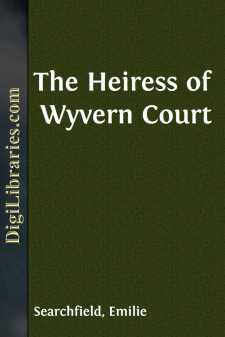Categories
- Antiques & Collectibles 13
- Architecture 36
- Art 48
- Bibles 22
- Biography & Autobiography 813
- Body, Mind & Spirit 142
- Business & Economics 28
- Children's Books 17
- Children's Fiction 14
- Computers 4
- Cooking 94
- Crafts & Hobbies 4
- Drama 346
- Education 46
- Family & Relationships 57
- Fiction 11829
- Games 19
- Gardening 17
- Health & Fitness 34
- History 1377
- House & Home 1
- Humor 147
- Juvenile Fiction 1873
- Juvenile Nonfiction 202
- Language Arts & Disciplines 88
- Law 16
- Literary Collections 686
- Literary Criticism 179
- Mathematics 13
- Medical 41
- Music 40
- Nature 179
- Non-Classifiable 1768
- Performing Arts 7
- Periodicals 1453
- Philosophy 64
- Photography 2
- Poetry 896
- Political Science 203
- Psychology 42
- Reference 154
- Religion 513
- Science 126
- Self-Help 84
- Social Science 81
- Sports & Recreation 34
- Study Aids 3
- Technology & Engineering 59
- Transportation 23
- Travel 463
- True Crime 29
The Heiress of Wyvern Court
Categories:
Description:
Excerpt
CHAPTER I.
“Well, little friend, and where do you hail from?”
The speaker was a merry-faced, brown-eyed boy of eleven, with curly brown hair—just the school-boy all over.
He had leaped into a railway carriage with cricket-bat, fishing-rod, and a knowing-looking little hamper, which he deposited on the seat beside him; then away went the snorting steam horse, train, people, and all, and out came this abrupt question. “Little friend” was a mite of a girl of nine, dressed in a homely blue serge frock and jacket, with blue velvet hat to match: a shy little midge of a grey-eyed maiden, with sunny brown curls twining about her forehead [p10] and rippling down upon her shoulders, nestling in one corner of the carriage—the sole occupant thereof until this merry questioner came to keep her company.
“I don’t quite know what you mean,” was the little girl’s reply—a sweet, refined way of speaking had she, and her eyes sparkled with shy merriment, although there was a startled look in them too.
“Well, where do you come from, my dear mademoiselle?” and now the merry speaker made a courtly bow.
“From London—but I’m not French, you know,” was the retort, with the demurest of demure smiles.
“No—just so; and where are you going?” One could but answer him, his questions came with such winning grace of manner.
“To Cherton—to uncle—to Mr. Jonathan Willett’s.”
“Cherton! why, that’s not far from my happy destination. I get out only one station before you.”
“Little friend” smiled her demure little smile again, as if she was glad to hear it.
[p11]
“So you’re going to Mr. Willett’s—Dr. Willett he’s generally called, being a physician,” continued the boy, after glancing from the window a second or two, as if to note how fast the landscape was rushing past the train, or the train past the landscape.
“Yes; do you know him?” inquired the silvery tongue of the other.
“Oh yes; I know him!”—a short assent, comically spoken.
“I don’t,” sighed the little girl, as if the thought oppressed her.
“Then you’d like to know what he’s like,” spoke the boy, using the word like twice for want of another.
“Yes—only—only would it be nice to talk about a person—one’s uncle, one doesn’t know, be——” she did not like to say behind his back, but the faltering little tongue stuck fast, and the small sensitive face of the child looked a little confused.
“Ah! behind his back,” spoke the boy readily. “Well, perhaps not; but you’ll know him soon enough, I’m quite sure, and all about Peggy, too. Peggy is the best of the couple,” he added.
[p12]
“Do you mean Mrs. Grant, my uncle’s housekeeper?”
“Yes, that very lady—only, you see, I like to call her Peggy.”
“Yes,” returned the child, supposing she ought to say something.
“’Tis a farm, you know—jolly old place. Do you know that?”
“Yes—that is, I know ’tis a farm; mamma told me that. But I didn’t know ’twas jolly; mamma said ’twas very pretty, and home-like, and nice.”
“Ah, yes!...


